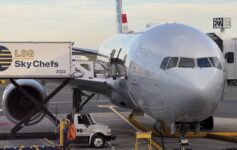Complying with new European environmental regulations, carriers are increasing their fares by adding “green fares” to fly cleaner. I’m skeptical it will last.
If you are considering booking travel or signing up for a new credit card please click here. Both support LiveAndLetsFly.com.
If you haven’t followed us on Facebook or Instagram, add us today.
European Regulations Regarding Sustainable Fuel Sources
Recent developments in environmental regulations across Europe are significantly reshaping the landscape for Sustainable Aviation Fuel (SAF). The European Union’s ReFuelEU Aviation initiative is leading the charge, mandating that SAF must constitute at least 2% of aviation fuel supplied at EU airports by 2025, with an ambitious target of 70% by 2050. This regulation is a cornerstone of the EU’s broader “Fit for 55” strategy, aimed at reducing carbon emissions by 55% by 2030.
Several countries are already taking proactive steps. Norway, for example, has implemented a blending mandate requiring 0.5% of aviation fuel to be advanced biofuel, with a target of 30% by 2030. Similarly, Sweden is enforcing a greenhouse gas reduction obligation that will see the SAF blend increase to 30% by 2030. Germany is focusing on e-kerosene, planning to introduce a 0.5% mandate in 2026, scaling up to 2% by 2030.
France is also heavily investing in SAF, committing €200 million to innovative SAF programs. These efforts are crucial in positioning Europe as a leader in sustainable aviation, despite challenges like high production costs and limited availability of renewable resources. These regulations and investments are vital steps toward achieving the long-term goal of net-zero carbon emissions by 2050. Rather than petroleum-based fossil fuels, the aviation industry is turning to less conventional jet fuel options like those derived from cooking oil. The air transportation sector is responsible for single digit greenhouse gas emissions, jet still targets a reduction of those emissions by up to 80% in as few as five years.
Airlines Add Fees, Some Optional, Maybe Compulsory
The reason adoption has to be mandated and regulated rather than electively chosen is due to the high cost of implementation.
“Prices will have to go up to account for the fact that flying with SAF in greater and greater volumes is materially more expensive,” Shai Weiss, Virgin CEO, explained to the media regarding the airline’s move. It’s estimated that the cost of SAF is triple the amount that airlines pay for kerosene, the form of jet fuel most carriers currently use.” – AFAR (emphasis mine)
Some carriers are adding fees to offset the switch to SAF fuel implementation.
“This past fall, Virgin brought attention to the issue when it operated the first-ever commercial transatlantic fully SAF-fueled flight. Virgin didn’t say how much fliers would pay for the new green surcharge, but media reports have suggested that it could be as high as 40 British pounds a ticket, or around US$52 based on current conversion rates.” – AFAR
Virgin hasn’t made it clear if it will apply the extra fees across the board to all flights, just to select flights, or as an add-on optional for guests. The optional additional fee has been remarkably unsuccessful. Carbon offsets, the environmental predecessor to SAF fees, which were optional for guests who chose to offset the carbon used by them for their flight, have been widely held as failures both commercially and in efficacy. Lufthansa has sold one million “green fares”, a noble gesture accounting for just 3% of the European airline group’s total flights.
Why This Actually Hurts Consumers, The Environment, And Governments
If adoption of SAF surcharges must be implemented without an option and airfares increase to and from destinations with such requirements, consumers will bear the burden of for-profit alternative fuel companies, airports, and service providers. Destinations with higher flight costs will be less likely chosen if flyers are considering other destinations. Those that suffer the most are, of course, those with the least means to travel at all, and for whom, an environmental tax adds considerable expense.
Indirectly, the environment will also suffer from such measures. How? If travelers can no longer afford to fly at the same rate, there will be open seats on airplanes. Open seats means fewer travelers to spread out the carbon emissions. A Boeing 787 can be a very efficient means of transportation when compared to less fuel efficient models. However, a 787 used as a private jet with few passengers would be egregiously inefficient and on a per capita basis terrible for the environment. There are other considerations to factor such as less fuel burn for lighter aircraft due to lower passenger count, but the question is how many consumers it prices out of these flights as to whether there is a material environmental benefit.
Lastly, governments will suffer from higher airfares due to policy implementation. Presumably, some tourists will choose alternative routes or destinations. Many flyers choose to eschew Britain’s onerous APD (Air Passenger Duty) by connecting elsewhere. It leaves Virgin Atlantic and British Airways disadvantaged against European rivals. The same could be true for carriers that have to comply with such requirements. As many are government-backed, losses could fall back on governments with fewer tourists and business travelers who are also financially responsible for state-owned carriers. Even airlines that are not wholly-owned by governments may be put in a position where the government must prop them up financially.
This comes at a time where there’s a general pullback in discretionary travel spend from all-time highs over the summer.
Conclusion
The competitive nature of consumer air travel will make the slightest uptick a disadvantage for carriers that must abide by sustainable fuel policies against those that do not. Optional measures have had limited success but whether consumers make alternative decisions based on these rules is yet to be seen. Alternative fuels, much like electric cars, should be a part of our future. However, it wasn’t until the right electric car came along that the market followed suit. Is this the right model? Time will tell.
What do you think?




The increased cost should not happen. Instead, it should be paid by the government, funded by increased taxes on the rich, who would be forced to pay their fair share. That is why Harris is a good choice this November. Punish them rich people.
@derek … Harris has four problems : cannot drive a stick shift , cannot parallel park , cannot think rationally, and has a horse-face .
DAAAAA the rich do PAY their fair share…so many non-motivated none working people pay nothing and we support them…..
Especially Harris’ illegal aliens ?
And when it does NOTHING to change the environment, who will be responsible for all that wasted money?
SO very true…
An absolute scam. 100% BS.
@Santastico … all airline fares are overpriced scams . Nothing new here .
I agree with Derek. The ultra wealthy should pay the tax rate the average American pays. And funding what needs to be done to help our planet makes sense.
As the climate heats up, it heats up the jet stream which causes more turbulence for planes.
Last year scientists from Reading University found that severe turbulence, from this clear air phenomenon, had increased 55% between 1979 and 2020 in the North Atlantic. They said that warmer air from increasing greenhouse gas emissions was changing the wind speed in the jet stream.
Worth investing in more climate friendly fuels to avoid potential increases in plane crashes or passenger injuries during flights.
chicken much ?
I disagree that the rich should pay the same as the average American. Harris wants to raise income tax to 44%. When state income tax is added, some people will be paying more than 50% in taxes. Yes, make them rich people slaves of the People!